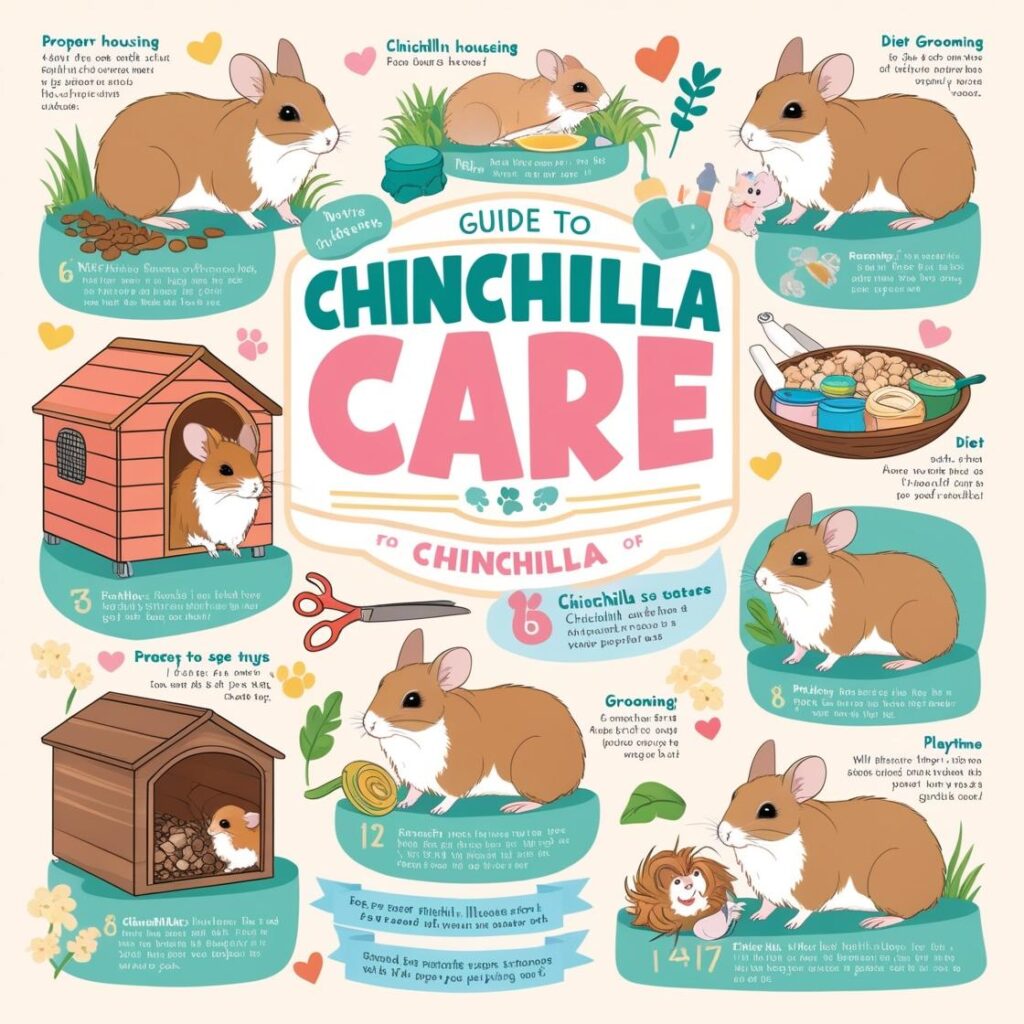Chinchillas are adorable, fluffy creatures that have gained popularity as pets in recent years. With their charming personalities and unique appearance, they can bring joy to any household. However, caring for a chinchilla requires a commitment to their specific needs and lifestyle. In this blog post, we will delve into the essential aspects of chinchilla care, ensuring a happy and healthy life for your furry friend.

Understanding Chinchillas
Before diving into care specifics, it’s crucial to understand what chinchillas are and where they come from. Native to the Andes Mountains in South America, these nocturnal rodents have become beloved pets worldwide due to their playful nature and soft fur. In the wild, chinchillas are social animals, living in groups that help them thrive in their natural habitat. As pets, they require similar social interaction and attention from their human caregivers.
Setting Up Your Chinchilla’s Habitat
Choosing the Right Cage
The first step in chinchilla care is providing an appropriate living environment. A spacious cage is paramount, as chinchillas require ample room to move around, exercise, and explore. Ideally, the cage dimensions should be a minimum of 24 inches wide, 24 inches deep, and 36 inches high. Multi-level cages are highly recommended, as they provide vertical space for climbing and hopping, which is crucial for your chinchilla’s well-being.
Materials and Layout
Chinchillas are prone to dental issues, so avoid cages with wire bottoms that may affect their feet. Instead, opt for solid flooring or add a soft bedding material like aspen shavings, paper-based bedding, or hay. Ensure that the cage includes:
- Hiding spots: Chinchillas feel secure in small, enclosed spaces. Include hideouts such as wooden houses or tunnels.
- Hammocks and shelves: These allow for climbing and resting, mimicking their natural environment.
- Food and water dispensers: A heavy ceramic bowl for food and a water bottle attached to the cage will keep them hydrated and nourished.
Nutrition
A balanced diet is crucial for maintaining your chinchilla’s health. Chinchillas are herbivores, which means their diet should primarily consist of high-quality hay, pellets, and occasional treats.
Hay
Timothy hay or orchard grass hay should be the foundation of your chinchilla’s diet. It provides essential fiber that aids in digestion and helps prevent obesity. Offer unlimited amounts of hay daily, as it not only sustains their nutritional requirements but also keeps their teeth healthy by promoting natural grinding.
Pellets
Choose a premium chinchilla pellet that is specifically formulated for them, as it will contain the right balance of nutrients. Avoid mixes with seeds and nuts, as these can be too high in fat and sugar.
Treats
Although chinchillas can enjoy treats, moderation is key. Safe treats include small amounts of dried fruits, such as apples or raisins, and vegetables like carrots or parsley, but these should be given sparingly. Overindulgence can lead to health issues like obesity and digestive problems.
Daily Care Routine
Social Interaction
Chinchillas are social creatures and thrive on interaction. Spend time each day handling and playing with your chinchilla to build trust and strengthen your bond. However, be gentle; they can be skittish, especially at first. Allow them to come to you, and try to observe their body language to understand their comfort level.
Enrichment Activities
Mental stimulation is as important as physical exercise. Provide various toys like wooden chews, tunnels, and climbing apparatus for your chinchilla to explore. Rotate these toys regularly to keep your pet engaged and prevent boredom.
Dust Baths
Chinchillas cannot be bathed in water due to their dense fur, which can lead to skin issues. Instead, provide a dust bath a couple of times a week. Use chinchilla dust, available at pet stores, and place it in a shallow dish. This dust helps to keep their fur clean and healthy.
Health and Wellness
Regular health check-ups are vital to ensure your chinchilla’s wellbeing. Be observant of signs of illness, such as changes in appetite, lethargy, or abnormal behavior. Consult a veterinarian knowledgeable about exotic animals for advice on vaccinations, dental care, and any specific health concerns.
Dental Care
Chinchillas have continuously growing teeth, so it’s essential to provide them with chew toys to help wear down their incisors naturally. Neglecting dental care can lead to serious health problems.
Grooming
Chinchillas generally groom themselves, but you may occasionally need to brush them to remove loose fur and prevent matting. This is particularly relevant during shedding seasons.
Environmental Controls
Temperature and Humidity
Chinchillas are sensitive to temperature and humidity. Ideally, their environment should remain cool, between 60°F and 70°F (15°C to 21°C), with low humidity (around 30-50%). Avoid placing their cage in direct sunlight or near heat sources like radiators and air conditioning vents.
Lighting
As nocturnal creatures, chinchillas are most active during the night. Ensure their habitat has a consistent light schedule that mimics natural day and night cycles. Provide dim lighting during the evening so they can feel comfortable and secure.
Conclusion
Caring for a chinchilla may seem daunting, but with the right information and commitment, you can provide a happy, healthy life for these delightful pets. By focusing on their dietary needs, social engagement, environment, and health care, you’ll foster a deep bond with your chinchilla that will bring joy for years to come. Remember, chinchillas are not just pets; they are companions that require love, understanding, and dedication.